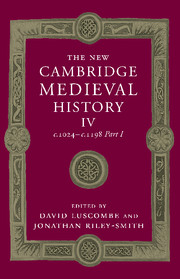Book contents
- Frontmatter
- 1 Introduction
- 2 The Rural Economy and Demographic Growth
- 3 Towns and the Growth of Trade
- 4 Government and Community
- 5 The Development of Law
- 6 Knightly Society
- 7 War, Peace and the Christian Order
- 8 The Structure of the Church, 1024–1073
- 9 Reform and the Church, 1073–1122
- 10 Religious Communities, 1024–1215
- 11 The Institutions of the Church, 1073–1216
- 12 Thought and Learning
- 13 Religion and the Laity
- 14 The Crusades, 1095–1198
- 15 The Eastern Churches
- 16 Muslim Spain and Portugal: Al-Andalus and its Neighbours
- 17 The Jews in Europe and the Mediterranean Basin
- 18 Latin and Vernacular Literature
- 19 Architecture and the Visual Arts
- List of Primary Sources
- Bibliography of secondary works arranged by chapter
- Index
- Frontispiece">
- Plate section"
- References
18 - Latin and Vernacular Literature
Published online by Cambridge University Press: 28 March 2008
- Frontmatter
- 1 Introduction
- 2 The Rural Economy and Demographic Growth
- 3 Towns and the Growth of Trade
- 4 Government and Community
- 5 The Development of Law
- 6 Knightly Society
- 7 War, Peace and the Christian Order
- 8 The Structure of the Church, 1024–1073
- 9 Reform and the Church, 1073–1122
- 10 Religious Communities, 1024–1215
- 11 The Institutions of the Church, 1073–1216
- 12 Thought and Learning
- 13 Religion and the Laity
- 14 The Crusades, 1095–1198
- 15 The Eastern Churches
- 16 Muslim Spain and Portugal: Al-Andalus and its Neighbours
- 17 The Jews in Europe and the Mediterranean Basin
- 18 Latin and Vernacular Literature
- 19 Architecture and the Visual Arts
- List of Primary Sources
- Bibliography of secondary works arranged by chapter
- Index
- Frontispiece">
- Plate section"
- References
Summary
the extraordinary achievements in thought and literature that took shape during the late eleventh and twelfth centuries reached different regions of western Europe in different forms and at different times. This rather obvious observation holds particularly true of literatures in languages that were late to acquire written forms. For instance, the typical characteristics of the twelfth-century Renaissance are established in the two major languages of France – Occitan (commonly known as Provençal) and French – well before the middle of the century, whereas with extremely rare exceptions they do not appear in the languages of Christian Spain – Galician-Portuguese, Catalan and Castilian Spanish – until the thirteenth century; and the corresponding efflorescence of medieval German courtly literature occurred late in the twelfth century and early in the thirteenth. The twelfth-century Renaissance eluded the English language (virtually the only extant verses were composed by Godric, a hermit and future saint who died in 1170), which came last in the triad of languages that were commonly used in England; but the century left an ample deposit in Anglo-Norman French and Latin literature. French and, even more, Latin served as the koine among the scholars who commuted incessantly across the Channel.
As the last statement suggests, neither the nature nor the timing of the literary flowering during the twelfth century can be understood without attention to the linguistic situations of the areas under consideration. Most important is to recognise the complex and fruitful diglossia that obtained in many locales; for a learned language has seldom coexisted so prosperously with vernacular dialects as Latin did with several of the Romance languages in the twelfth century.
- Type
- Chapter
- Information
- The New Cambridge Medieval History , pp. 658 - 692Publisher: Cambridge University PressPrint publication year: 2004
References
- 1
- Cited by

